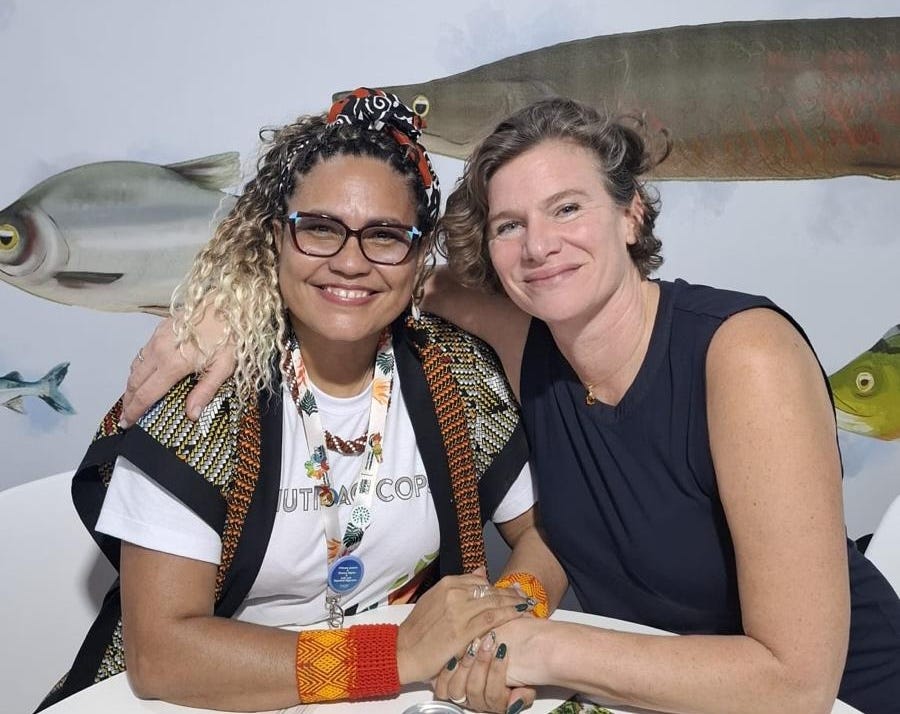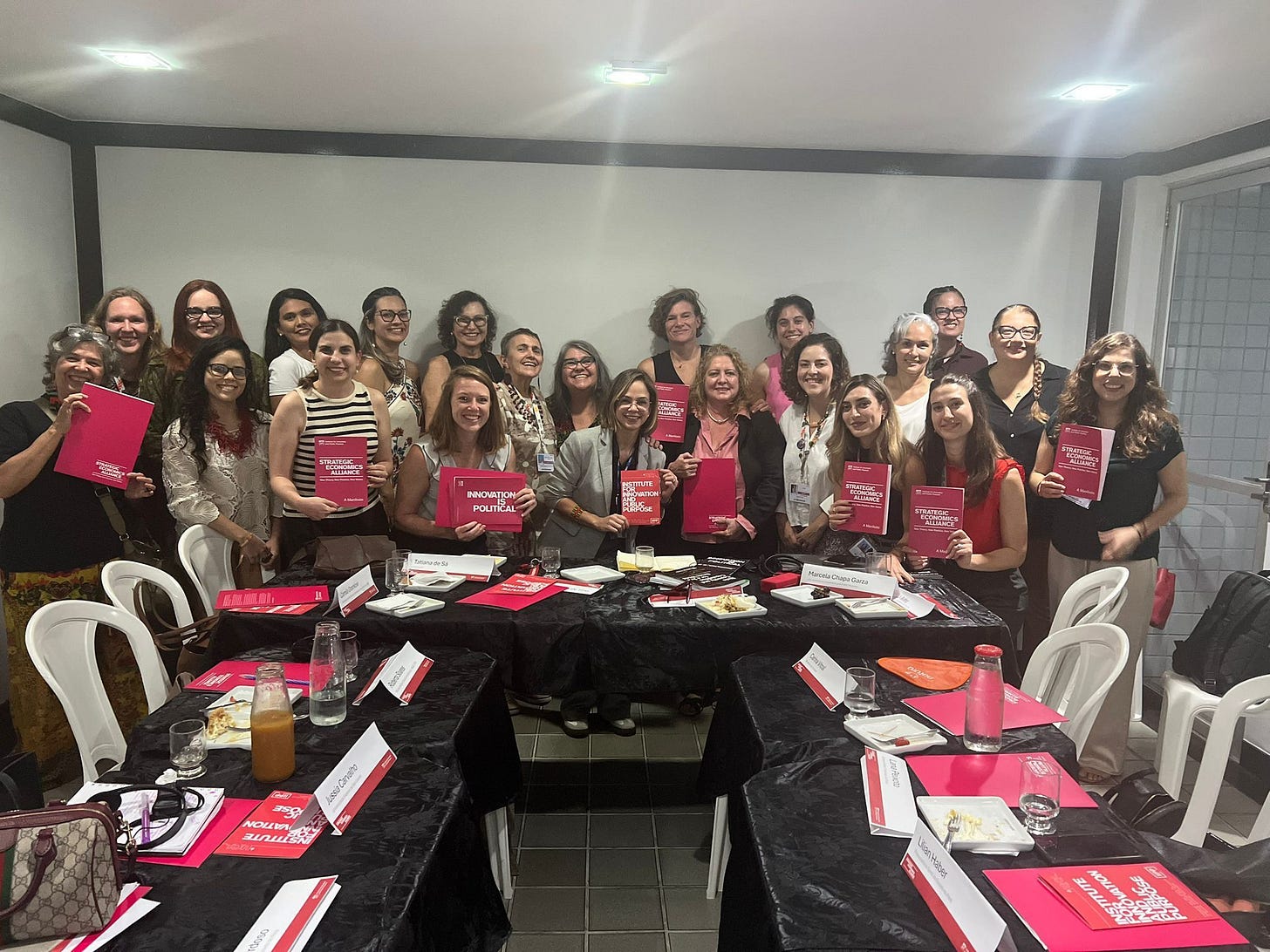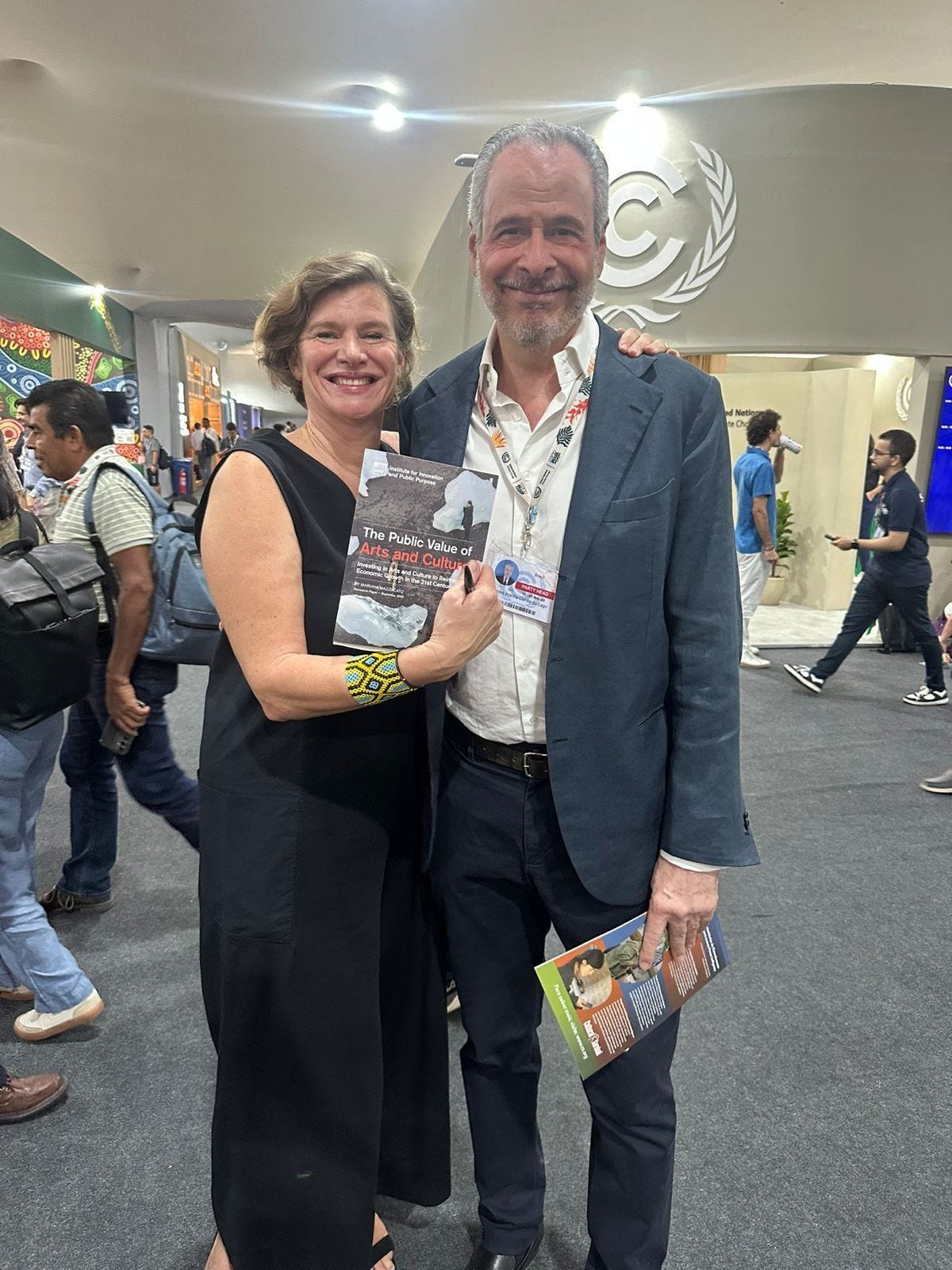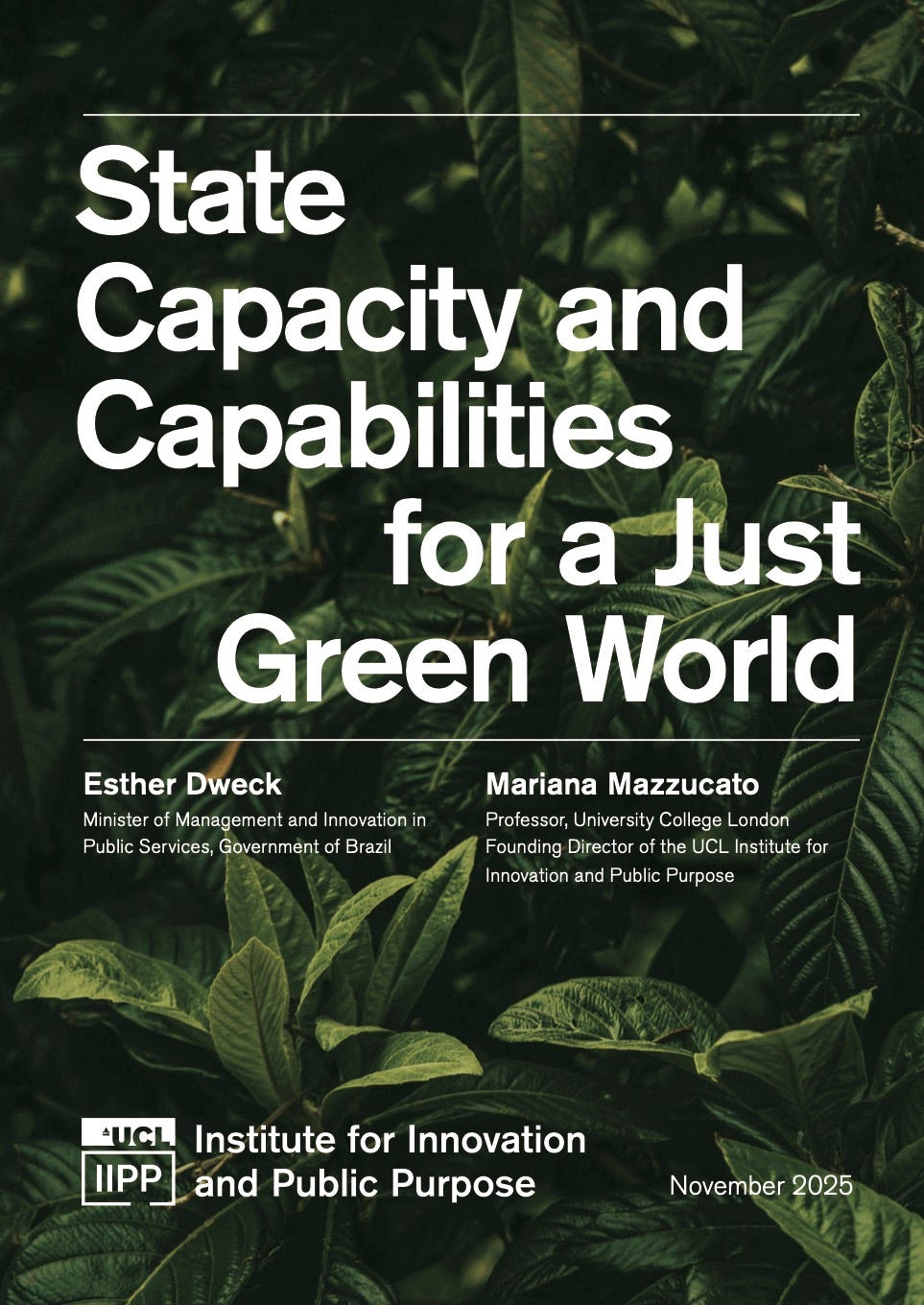Dispatches from Belém
COP30 and why building state capacity includes developing the capacity to listen
COP30 ended without the fossil fuel phase-out language many had hoped for. Whilst governments of Colombia and the Netherlands stepped forward to announce they will co-host the First International Conference on the Just Transition Away from Fossil Fuels in April 2026, and 24 countries signed the Belém Declaration supporting a global roadmap, the final COP30 text made no mention of fossil fuels. This was deeply disappointing. Yet what did come through clearly was Brazil’s emphasis on solutions over pledges – and that shift in framing matters. We need to move beyond declarations to the machinery of delivery.
Two weeks ago in a very hot Belém, at Brazil’s “Solutions COP”, we launched two pieces of work that point to what must come next if climate ambition is to become climate action: our State Capacity and Capabilities for a Just Green World report, co-authored with Brazil’s Minister of Management and Innovation in Public Services (MGI), Esther Dweck, and our working paper on Mission-Oriented Country Platforms: Engines for a just green transition. Both have a similar fundamental argument: state capacity is climate policy.
10 years on from the Paris Climate Agreements at COP21, the world is not short on declarations and targets. What’s missing is the ability to design, coordinate, and deliver change at the speed and scale the crisis demands. COP30 made this brutally clear. Whilst governments pledged billions for climate finance and announced ambitious new NDCs, the machinery needed to turn those commitments into tangible outcomes – in energy systems, transport networks, food production, and resilient infrastructure – remains dangerously underdeveloped. Ambition has outpaced execution: pledges abound, but governance and public-purpose finance remain bottlenecks.
State Capacity: The missing link
Building on a two-year partnership between UCL IIPP and MGI, our report, presents a framework for how governments can rebuild institutional capabilities that decades of austerity, outsourcing, and market fundamentalism have systematically dismantled. This isn’t about bureaucracy for its own sake. It’s about dynamic capabilities: the ability to learn, adapt, experiment, and coordinate across government and with businesses, labour, and communities — investing in policy labs, learning by doing, and reducing reliance on consultants, as I laid out in my book The Big Con: How the consulting industry weakens our businesses, infantilizes our governments and warps our economies, who have reduced government capabilities rather than strengthening them.

Brazil is showing what this looks like in practice. Through the Ecological Transformation Plan, the New Growth Acceleration Plan, and mission-oriented industrial policy, the government is aligning economic, social, and environmental priorities by redesigning the tools of the state itself — from strategic procurement that creates markets for green solutions, to state-owned enterprises with mandates aligned to climate goals, to digital public infrastructure that accelerates delivery. Brazil’s Pix payment system and Rural Environmental Registry demonstrate what becomes possible when governments invest in the data, systems, and skills needed to turn plans into results.
My co-author, Esther Dweck, Brazil’s Minister for Management and Innovation in Public Services, participated in the launch through a video message shared during the session:
The report identifies six core areas where states must invest:
Embedding directionality in policy design so outcomes advance climate goals
Investing in dynamic capabilities that allow states to be fit for purpose
Shaping policy instruments to create market opportunities for firms willing to align with climate goals
Empowering institutions and aligning mandates to deliver climate outcomes
Governing data, AI, and digital public infrastructure to produce verifiable climate results
Building a new social contract to mobilise joint climate action
Beyond Blended Finance: Mission-oriented country platforms
Our working paper on country platforms tackles how to mobilise and deploy finance effectively. The prevailing “filling financing gaps” approach through blended finance has repeatedly fallen short – delivering just $15 billion annually versus trillions needed, with flows going to already bankable assets rather than system-critical public goods that enable transformation. Mission-oriented country platforms offer an alternative: nationally led implementation hubs aligning governance, finance, partnerships, and state capacity so capital, policy, and institutional capability move in lockstep toward missions anchored in NDCs.
At our launch event with José Scheinkman, Chair of the Ad-hoc Economic Council Committee to the COP30 President, and Ambassador André Corrêa do Lago, broad alignment emerged on needing investment-grade pipelines and portfolio platforms, but tensions remained around prioritising instrument engineering versus building state capability. Both matter – but without capable states, even the best-designed instruments will fail to deliver.

The Protest and What it Tells Us
On the opening day of COP30, Indigenous peoples and civil society organisations staged a protest that disrupted several Blue Zone events, demanding greater representation in climate negotiations and criticising the influence of fossil fuel interests. The disruption halted several events, including some I was scheduled to speak at, and it matters profoundly. It reflected legitimate frustration from Indigenous communities that their voices are still treated as peripheral rather than central to climate governance.
This connects directly to state capacity. Capable states don’t just deliver programmes; they build legitimacy through genuine participation and co-creation. The report emphasises that climate action must be organised as a whole-of-society endeavour, with workers, communities, and businesses engaged as agents of change who contribute voice and expertise. The principle is demanding: “nothing about us without us” – consultation must happen in territories, on communities’ terms, not through token representation in distant institutions. This is foundational to building durable coalitions that can sustain climate action over decades.
Indeed, perhaps my most significant conversation in Belém was my meeting with Edel Moraes, Secretary of Traditional Peoples and Communities in Brazil’s Ministry for Environment and Climate Change, where we discussed what it means to ensure that communities are genuinely in the driver’s seat of transformative climate policy. This isn’t about consultation as an afterthought; it’s about recognising that Indigenous communities are already doing the work of forest protection and climate mitigation, and that economic policy must value that contribution from the start. One concrete example is the Bolsa Verde programme, which provides direct payments to families engaged in conservation activities – recognising and compensating care work already performed rather than redistributing after the fact.

This principle became tangible at the Amazon Fund dialogue at the Brazilian Pavilion, where donor countries joined Brazil’s Environment Minister Marina Silva and BNDES’s Socio-environmental Director, Tereza Campello, to discuss the Fund’s achievements. Whilst the Fund represents an important model of results-based climate finance – having mobilised USD 1.57 billion over 17 years to support more than 140 projects – the scale remains insufficient. The Fund’s total disbursement of just over R$1 billion across seventeen years pales against global climate investment needs exceeding USD 8 trillion annually until 2030. As I emphasised in the dialogue, the bottleneck is not merely financial volume but how that money is governed and spent. Creating a fund that embeds community and Indigenous knowledge in its design – not just consultation but genuine co-governance – matters as much as the funding itself. Resources must flow directly to communities doing the work, without intermediation layers that dilute impact and agency. The Fund must deepen participation, with Indigenous and traditional communities shaping priorities, oversight, and implementation, not only receiving project-level support.
New Voices: bridging economics, science, and traditional knowledge
As we heard in the reflective space we organised through our UCL IIPP Strategic Economics Alliance (SEA) in collaboration with the Center of Advanced Amazonian Studies at the Federal University of Pará, traditional knowledge systems remain systematically undervalued and excluded from decision-making, even as international finance flows are negotiated over their territories. The session brought together women economists, researchers, and representatives from Indigenous and traditional communities to move beyond abstract debates toward concrete questions: How do we intentionally combine economics, science and Indigenous knowledge in designing financial instruments? Who defines public value, and what does “real governance” with communities actually look like?

The discussions surfaced critical tensions. Participants emphasised “nada sobre nós sem nós” – nothing about us without us – insisting that consultation must happen in territories, not in distant institutions or conference halls. As one participant powerfully argued, if you want to know what to do in my territory, you must come to my territory. This isn’t simply about inclusion; it’s about confronting what Professor Nirvia Ravena, from the Center for Advanced Amazonian Studies, termed “epistemic assassination” – when extractive models erase languages, local epistemologies, and the traditional knowledge that has sustained forest ecosystems for generations. The challenge, as the session made clear, is designing bioeconomic models and climate finance mechanisms that fit diverse territories rather than imposing standardised solutions, and ensuring that the productivity gap between family agriculture and agribusiness is addressed not through assumptions about capability but through access to appropriate technology and machinery configured for local contexts.
What now?
COP30 positioned itself as the “Solutions COP”, and the Brazilian Presidency – through Ambassador André Corrêa do Lago’s leadership – framed this around moving from promises to proof, from declarations to delivery. That framing is right. What we need now is to institutionalise the conditions that make delivery possible: defining clear national directions that embed climate goals in development and industrial strategies; aligning public finance to signal opportunities; developing catalytic investment programmes that replace fragmented projects with costed, sequenced portfolios; making partnerships reciprocal and accountable through clear conditionalities; and investing in cross-sectoral delivery architecture combining political leadership with whole-of-government coordination.

As we look ahead to COP31 in Colombia next year, the challenge will be embedding these learnings – including the need to embed community knowledge in the design and implementation of climate policy and prioritising implementation over further unending declarations – and to finally put an end to fossil fuels.
Further reading:
Mazzucato, M. (ed.) (2024). State Transformation in Brazil: Designing mission-oriented public procurement, state-owned enterprises and digital public infrastructure to advance sustainable and inclusive growth. UCL Institute for Innovation and Public Purpose. IIPP Policy Report 2024/15. Available at: https://www.ucl.ac.uk/bartlett/public-purpose/policyreport-2024-15
Mazzucato, M. (2025). The Public Value of Arts and Culture: Investing in Arts and Culture to Reimagine Economic Growth in the 21st Century. UCL Institute for Innovation and Public Purpose. Available at: https://www.ucl.ac.uk/bartlett/publications/2025/sep/public-value-arts-and-culture
Dweck, E. and Mazzucato, M. (2025). State Capacity and Capabilities for a Just Green World. UCL Institute for Innovation and Public Purpose. IIPP Policy Report 2025/07. ISBN: 978-1-917384-41-4 Available at: https://www.ucl.ac.uk/bartlett/publications/2025/nov/state-capacity-and-capabilities-just-green-world
Mazzucato, M. and Heher, U. (2025). Mission-Oriented Country Platforms: Engines for a just green transition. UCL Institute for Innovation and Public Purpose, Working Paper Series (IIPP WP 2025-20). ISSN 2635-0122. Available at: https://www.ucl.ac.uk/bartlett/publications/2025/nov/mission-oriented-country-platforms-engines-just-green-transition
Mazzucato, M. (2025). The Key to Unlocking Climate Progress. Project Syndicate, November 2025.


